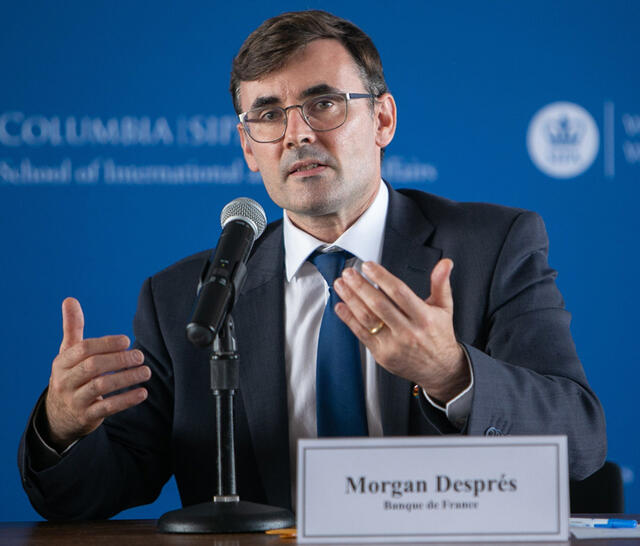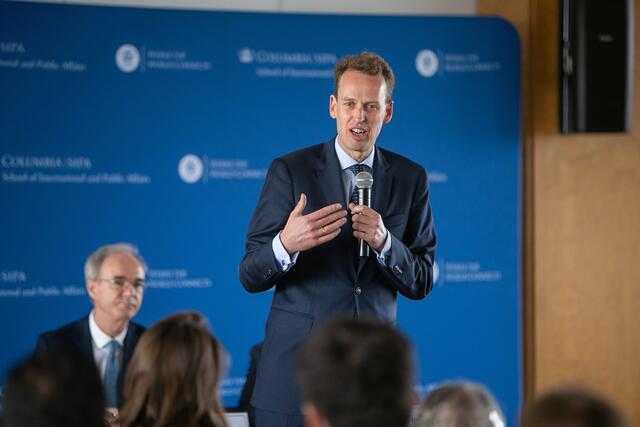
Central Banks Grapple with Climate Change

As more sectors grapple with climate change, some of the world’s central banks have begun to seriously consider how to best combat it. And some central bank executives argue they have already stepped up to the task.
In a September 24 visit to SIPA, key officials from the central banks of France and the Netherlands discussed how each bank is taking proactive measures to stop against the almost-irreversible damaging effects of climate change. Morgan Després is deputy head of Banque de France’s financial stability department, while Frank Elderson is executive director of supervision for De Nederlandsche Bank NV.
The event was sponsored by the MPA in Economic Policy Management, the Initiative for Central Banking and Financial Policy and the Center on Global Economic Governance.
“The challenge is enormous,” said Columbia Business School professor Patrick Bolton, who moderated the discussion. “But the good news is that we’re racing. But still, the challenge is enormous.”
The discussion took a somber look at the current catastrophic effects on the world resulting from climate change, from rising sea level to increased carbon emissions, and how public policy is attempting to combat those problems, such as transitioning from fossil fuels to more sustainable forms of energy, or sharing state-wide energy goals.
The conversation then turned to the role central banks play—or should—in also ameliorating the effects of climate change.
“Climate change risks have financial risks,” said Elderson. “And through that lens, we are responsible for managing financial risk.”
Elderson emphasized his role in supervision, observing that he often encounters people who believe climate change is a problem that will manifest in the future, rather than one that’s already here.
He suggested that even those who wish to act faster may be underestimating the problem.

Elderson cited several steps the Dutch central bank has taken in order to get a better understanding of just how serious climate change’s effects are—and how to convince others to get on board and act quickly. They include looking at historical data and running stress testing against a variety of scenarios to get a financial risk assessment of how the banks should combat climate change.
“It’s very sweet macroeconomics,” Elderson said with a slight grin. “But the economists that I’ve talked to said that even they grossly underestimate the real costs,” adding the “nonlinear” nature of climate change makes it all the harder to put a fiscal number to its disastrous physical effects.
Després spoke more about the role of regulation, adding that where the central banks of the world lack the government power to enact public policy, they do carry the financial power to influence change.
The French central bank executive spoke to the power each country’s central bank has in governmental affairs, and how to best address different markets according to their capacity.
“In emerging countries, it’s more about mitigation,” Després began. “There is a distinction between our concerns and your concerns, and all the danger that comes these things,” Després said while referencing the impact climate change has on water and soil pollution is all the more detrimental in certain parts of the world than in others.
“We are not thinking in terms of billions, we are thinking in terms of trillions,” Després concluded. “And these trillions obviously will not just come from the public sector. They can only from great support from the private sector.”
“And, of course, the financial sector needs to play a crucial role.”
As the two spoke about their banks’ efforts to combat climate change internally within their respective countries, they also addressed the greater scheme at large, of how the financial sector should be taking a proactive role to stop the proliferating effects of climate change.
During an enthusiastic Q&A where SIPA students and environmentally-conscious guests patiently waited to ask questions and share concerns, Elderson and Després spoke to the current financial environment leading the charge for a cleaner environment. More than once, the two said there is a newfound passion for stopping climate change—especially in the financial sector, when the fiscal risks are finally seen on a grand scale.
Referencing micro-financial workstreams, Després said “what we’re trying to do is to take a look at the existing scenarios, together with the climate but also financial sectors and select a handful of scenarios, let’s say four or five, as being plausible and within range of plausible outcomes.”
“Because at the end of the day, we are not going to forecast what we don't know. But at least we want to cover the ground to make sure that, let's say in the high levels, that would cover several possibilities, in which one would be maybe very pessimistic, and another one would be very optimistic.”
However at the end of the day, the two agreed, not much is known, but action is needed.
“We can research this, note many of these questions,” Elderson concluded. “But knowledge comes first by asking the right questions.”
— Catherina Gioino MPA ’20